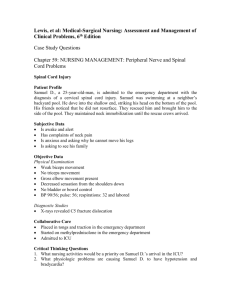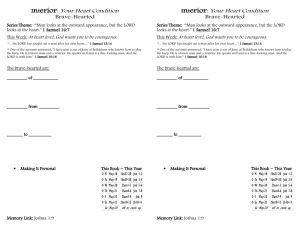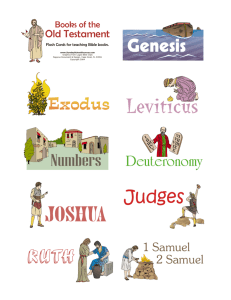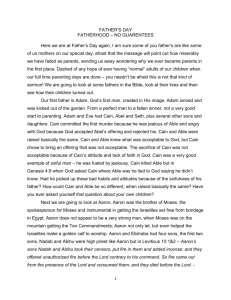Three Fathers Who Failed
advertisement
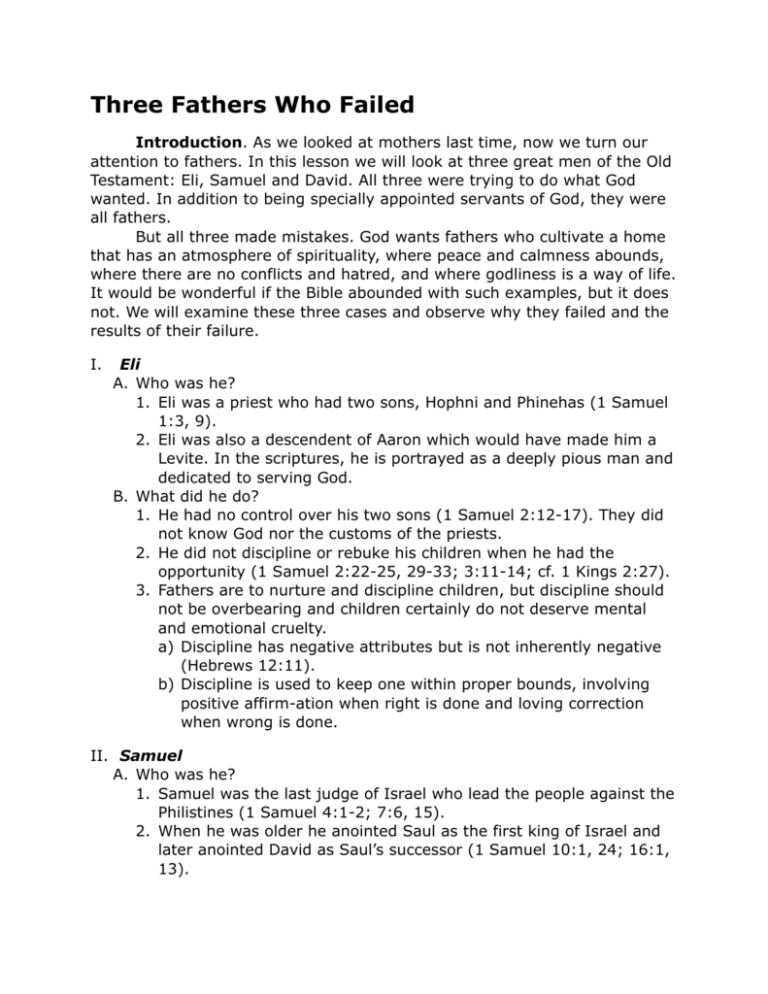
Three Fathers Who Failed Introduction. As we looked at mothers last time, now we turn our attention to fathers. In this lesson we will look at three great men of the Old Testament: Eli, Samuel and David. All three were trying to do what God wanted. In addition to being specially appointed servants of God, they were all fathers. But all three made mistakes. God wants fathers who cultivate a home that has an atmosphere of spirituality, where peace and calmness abounds, where there are no conflicts and hatred, and where godliness is a way of life. It would be wonderful if the Bible abounded with such examples, but it does not. We will examine these three cases and observe why they failed and the results of their failure. I. Eli A. Who was he? 1. Eli was a priest who had two sons, Hophni and Phinehas (1 Samuel 1:3, 9). 2. Eli was also a descendent of Aaron which would have made him a Levite. In the scriptures, he is portrayed as a deeply pious man and dedicated to serving God. B. What did he do? 1. He had no control over his two sons (1 Samuel 2:12-17). They did not know God nor the customs of the priests. 2. He did not discipline or rebuke his children when he had the opportunity (1 Samuel 2:22-25, 29-33; 3:11-14; cf. 1 Kings 2:27). 3. Fathers are to nurture and discipline children, but discipline should not be overbearing and children certainly do not deserve mental and emotional cruelty. a) Discipline has negative attributes but is not inherently negative (Hebrews 12:11). b) Discipline is used to keep one within proper bounds, involving positive affirm-ation when right is done and loving correction when wrong is done. II. Samuel A. Who was he? 1. Samuel was the last judge of Israel who lead the people against the Philistines (1 Samuel 4:1-2; 7:6, 15). 2. When he was older he anointed Saul as the first king of Israel and later anointed David as Saul’s successor (1 Samuel 10:1, 24; 16:1, 13). B. What did he do? 1. He turned leadership of Israel over to his two sons, Joel and Abijah, who did not walk in his ways and who pursued dishonest gain and perverted justice (1 Samuel 8:1-3). 2. Perhaps the likely reason is stated in 1 Samuel 7:15-17. He traveled much over his territory probably did not spend as much time at home as he should have. a) Parenting is not all about discipline, but also instruction (Exodus 12:25-27). b) How sad it is when children learn more about sports heroes, mechanical skills, television, etc., from their parents and not the word of God! III. David A. Who was he? 1. David was the second king of Israel (1 Samuel 16:12-13). 2. He was considered a man after God’s own heart (1 Samuel 13:14; Acts 13:22). B. What did he do? 1. He lusted for and committed adultery with Bathsheba (2 Samuel 11:4). 2. He had Bathsheba’s husband, Uriah, killed (2 Samuel 11:15). 3. He took Bathsheba as his wife and she bore a child (2 Samuel 11:27). 4. Children need shining examples of righteousness from their parents (Matthew 5:13-16; Galatians 2:20; Philippians 2:15). Conclusion. Every one of these men were servants of righteousness yet their children were not faithful to God. With Eli, we saw the failure to discipline children and its results. How many fathers are too afraid to discipline their children today? With Samuel, we saw the failure of children being prioritized with parents. How many fathers work too hard and forget about their children’s spiritual well-being today? With David, we saw his immoral character and how his family suffered greatly because of it. How many fathers have the morals which threaten to destroy families today? In all three of these cases, God was not a priority in their lives and all three fathers demonstrated the how tragic it is when children are persuaded to follow in wicked footsteps (1 Samuel 24:13). In all three of these instances, it is plain to see that these situations developed as they did because God’s word was not followed. How different would these circumstances have been if these men were only godly (Psalm 1:1-3)! It is very easy to see that children can and will be influenced by their fathers in the wrong way (Nehemiah 13:23-24). It is best for a mother and father to have obedience to God as a common ground.


